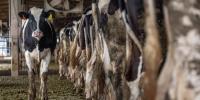General promotion of meat and dairy products should be a thing of the past

Over and over again, we are told that the agricultural sector and the food industry merely meet consumer demands for products. This argument is also frequently used in the current debate about a Danish climate tax to be levied on agriculture. Quite simply this is not correct, however. As it happens, enormous resources are spent on making us continue an excessive consumption of the most climate-damaging food products, to the detriment of the climate, the environment and our health.
Let alone in Denmark, the food industry and the public sector spend millions of Danish kroner (and euros) on tempting the consumers to eat more meat and dairy products. Precisely how much is not known, but let alone the EU subsidies spent on Danish marketing campaigns promoting meat and dairy products run into two-digit million figures. In addition to this, in 2021 the food sector foundations “Promilleafgiftsfondene” spent just short of 30m DKK (4m EUR) on promoting the demand for animal-based foods in Denmark.
In a situation, where there is scientific and political consensus about the fact that in countries such as Denmark we have to eat notably less meat and fewer dairy products to the benefit of the climate and public health, this type of promotion makes no sense. Public funding of such promotion activities must come to a stop within the immediate future, and responsible food producers should avoid marketing that encourages increased consumption of meat and milk.
Much to gain by living by the official dietary guidelines
The Danish Official Dietary Guidelines were launched in January 2021 and are based on a scientific analysis of human nutrient requirements and how we can obtain these nutrients with the least possible impact on the climate. According to the guidelines, a person should eat no more than 350 grams of meat, including poultry, a week and consume 250 mL of milk and 20 grams of cheese a day. The guidelines further recommend people who do not want to drink milk or eat dairy products to take care to obtain the required nutrients from other foods, for example calcium enriched plant drinks, green vegetables, nuts, sardines and whole grain products.
If the Danish population is to comply with the official dietary guidelines, the current average consumption of beef, lamb and pork will have to be reduced by 90 percent and the current average consumption of poultry and dairy products by about 30 percent. Instead, the Danes should eat more fish and whole grain, much more fruit and green produce and a whole lot more of the protein-rich legumes such as beans, lentils and chick peas.
According to an analysis produced by the Danish Council on Climate Change, for ourselves as human beings and for society the positive outcome of a varied diet rich in plants would be a reduction in greenhouse gas emissions from our food consumption by up to 45 percent, and according to an analysis by the University of Copenhagen the resulting health economic benefits could amount to almost 12 billion DKK (1.6 billion EUR) a year.
Many examples of campaigns and measures pulling in the wrong direction
Although the large organizations for agriculture and the food industry and also the large animal-based product manufacturers are officially backing the official dietary guidelines, we continue to see numerous examples of ads, campaigns and lobbying that attempt to maintain or promote the consumption of meat and milk. Some of these even with the explicit objective to make us increase our consumption of meat and dairy products.
Below are some examples of marketing campaigns and other initiatives from the past five years launched by agriculture and the food industry that pull in the wrong direction as far as compliance with the official dietary guidelines is concerned.
HAPPY ABOUT PORK (GLAD FOR GRIS): In 2019, the Danish Agriculture & Food Council and the Swedish sister organization Svensk Kött joined forces to launch a campaign in Denmark and Sweden with the explicit objective to stop the declining consumption of pork among young consumers. The campaign lasted for three years and boasted a budget of 23 million DKK (3.1 million EUR) of which 20 percent was funded by the two countries and the rest by public funds from EU promotion schemes.
JUST ADD SOME CHEESE: In 2020, the dairy producer Arla launched this campaign which is set to run over several years. The explicit objective of the campaign was to revert the declining sale of cheese among young people. The campaign was described as one of Arla’s largest marketing campaigns which intends to “awaken their love for cheese by showing them – with a touch of humour – all of the inspiring ways of using cheese when cooking.” The budget and the funding of this campaign are not known.
MILK FOR THE FUTURE (MÆLK ER FOR FREMTIDEN): In 2022, the Danish Dairy Board launched an EU funded campaign. Using media ads and outdoor ads with the headline “Together for a sustainable way in Europe” and an image of children drinking milk, the Dairy Board conveyed the message that “Milk is for the future and part of a sustainable diet.” Individuals taking a particular interest in the message and who decided to read the “small print” on the campaign website could in fact find information about the official dietary guidelines here. However, the campaign does not provide immediate information about the need to reduce the consumption of dairy products in Denmark – or how to obtain the required nutrients from other foods – and so the campaign promotes milk and dairy products rather than providing information about healthy and sustainable dietary habits.
CHEESE AND COW (OST & KO): Since 2015, the Danish Dairy Board has been running the EU funded campaign “Cheese and cow”. This campaign is part of a Pan-European effort to promote the cheese culture in Denmark, France, Ireland and Northern Ireland with particular emphasis on stimulating the interest for cheese among the younger consumers. The campaign's latest initiative is a campaign video with the message “Organic cheese. As organic as all other organic products you buy.” And you see a farmer pulling cheese out of the soil and picking cheese from trees. There is not a single cow to be seen and the message blows in the wind; however, there is no doubt that this is a general promotion of organic cheese.
MILK WITHOUT MILK (MÆLK UDEN MÆLK): In 2018, Arla ran a campaign that reduced plant-based drinks to products which were “definitely without nutrients.” The campaign promoted its fictitious plant-based drink with the following text, “This milk without milk is 100% free from calcium and protein and has never been even close to vitamins B2 or B12. You can safely enjoy it without the risk of consuming nutrients. Enjoy!” This is despite the fact that several plant-based drinks do in fact contain all of these nutrients, except Arla’s own plant-based drink, Jörd, which saw the market in 2020.
VEGGIEBURGER-GATE: Another example from the “Attempted Obstruction of Plant-Based Alternatives” category saw the light of day when the European Parliament's Committee on Agriculture voted in favour of banning the use of product designations such as burger, sausage and schnitzel about plant-based products in 2019. The proposal was given very active support by the European farming organization Copa Cogeca and none of the farming organizations in Denmark raised their voices against it. Fortunately, the proposal was rejected by the final vote of the European Parliament, and this paved the way for the veggie burgers, veggie schnitzels, veggie patés and other plant-based products from Danish Crown we can enjoy today.
MISLEADING CLIMATE LABELLING: Last but not least it was recently revealed that a number of stakeholders in the working group for climate labelling, set up by the Danish Veterinary and Food Administration (Danish Agriculture & Food Council, the Confederation of Danish Industry, the Branded Manufacturers Association, FødevareDanmark and the Danish Fishers PO), insisted that vegetable-based products may not be compared with animal-based products under the future food climate label. If this requirement is accepted and implemented, this will in effect constitute state-authorized greenwashing of animal-based products that are characterized by a higher climate footprint than the vegetable-based alternatives. Contrary to fridges and washing machines, food products are easy to substitute across categories. For example, hummus would be a far more climate-friendly choice than cheese as a bread spread and a veggie schnitzel would be a more climate-friendly choice than a pork chop. Consequently, the future climate labels should preferably provide the consumer with information about the climate footprint of food products across all categories.
Put a stop to the general promotion of meat and milk and provide consumers with relevant and correct information
The times are changing, and some of the examples of campaigns and activities referred to above that pull in the wrong direction might be presented differently today. Undoubtedly, however, animal-based products and the relevant interest organizations continue to tempt consumers with their meat and dairy products and encourage them to consume more than is good for our planet and our health, and in some cases directly obstructing the necessary conversion to a plant-rich diet.
Going forward, food producers ought to pursue another strategy and avoid tempting the consumers to continue their high consumption of meat and dairy products and instead encourage the public to consume these types of food in more moderate quantities. If we adhere to the principle “less is better”, the marketing of meat and dairy products should focus on the concrete qualities and benefits these products have to offer for various relevant parameters such as health, climate footprint, environmental impact, origin, nature conservation or animal welfare.
Political decision makers should cancel all public subsidies spent on the general promotion of meat and dairy products as soon as possible. In addition to this, they can make their contribution to ensuring correct and relevant communication about the climate to the consumers by supporting the development of a comprehensive and complete official Danish climate database that will provide information about the climate footprint of various types of food and also a climate labelling scheme which compares the climate footprint of various foods across all types of foods. Finally, the politicians can decide to make the enforcement of the marketing act more rigorous and more active with the result that green claims about food presented for marketing purposes will become true to fact and evidence can be provided. This will be to the benefit of the consumers and of the enterprises with a climate and environmental profile that are genuinely among the best.
A Danish version of the opinion piece was published in Klimamonitor on March 28, 2023.

